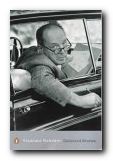a critical examination of Nabokov’s collected stories
 No matter how far geographically, culturally, and linguistically Nabokov moved from his native Russia, there is reflected at a very deep level in his work firm links with its literary traditions. His characters and their concerns echo those of Pushkin, Gogol and Dostoyevski. The precision of his descriptions of the material world show powers of observation similar to those of Tolstoy, who he admired so much. His concern with literary style, his playfulness and sense of the absurd are deeply influenced by Gogol, whose ‘The Overcoat’ he describes, emphasising his enthusiasm for sheer literary aesthetics, as
No matter how far geographically, culturally, and linguistically Nabokov moved from his native Russia, there is reflected at a very deep level in his work firm links with its literary traditions. His characters and their concerns echo those of Pushkin, Gogol and Dostoyevski. The precision of his descriptions of the material world show powers of observation similar to those of Tolstoy, who he admired so much. His concern with literary style, his playfulness and sense of the absurd are deeply influenced by Gogol, whose ‘The Overcoat’ he describes, emphasising his enthusiasm for sheer literary aesthetics, as
‘mumble, mumble, lyrical wave, mumble, lyrical wave, mumble, lyrical wave, mumble, fantastic climax, mumble, mumble, and back into the Chaos from which they had all derived. At this superhigh level of art, literature…appeals to that secret depth of the human soul where the shadows of other worlds pass like the shadow of nameless and soundless ships’ (LRL,p.60)
His stories, like his novels, show a consistent development in the ornamentation and the florid nature of his literary style. They also reveal his successful experiments with mixed narrative modes. Even with the added flourishes of his later translations and revisions, the earlier stories are written in a fairly plain manner. His consistency of tone and the focus of attention required in the modern short story are exemplary.
Edith Wharton claimed that the successful writer of short stories must produce ‘what musicians call “the attack”…If his first stroke be vivid and telling the reader’s attention will be immediately won’ (Wharton,p.51). But as the long succession of beautifully executed stories went on he not only struck the right note; he elaborated it, maintaining the note but also adding his own rhetorical decorations whilst at the same time moving fluently from one narrative mode to another.
It is not common for Nabokov to be considered alongside fellow modernists such as Katherine Mansfield and Virginia Woolf; but in fact he was writing at the same time as they were, and was interested in the same forms of experimentation – notably that of moving from (for example) third person narrative mode, into unarticulated first person thought, and back out again without any formal indication to the reader. He also employs the same sorts of abrupt transitions, elisions, poetic repetitions, and prose rhythms which characterised their respective styles.
But it perhaps in his deployment of the first person conversational mode that his florid style is most evident. This is more easily discernable in his novels of course, but even in the short stories there is a marked tendency towards self-conscious and artful forms of address amongst his narrators.
His early narrators tell their tales with interesting or amusing asides, but in the later stories they address the reader directly, address their own characters, think aloud, pose questions, answer them, and muse reflectively in a manner which forces the reader to work hard keeping track of an often kaleidoscopic train of thought.
The artful first person narrator is also connected with another prominent feature of Nabokov’s work – his obvious joy in constructing unstable narratives and unreliable narrators. More than most other modern writers he seems to have explored the possibilities and subtleties of communicating to and posing problems for the reader behind the backs of his narrators.
Many other writers have used these devices since and taken them to such extremes that common and even professional readers have decided that the effort demanded of them is not amply compensated by the aesthetic reward; but Nabokov’s special skill is in having created this narrative complexity without moving outside the traditional notions of what is acceptable and accessible to the normal intelligent and attentive reader.
© Roy Johnson 2005
![]() Vladimir Nabokov: The Collected Stories – Amazon UK
Vladimir Nabokov: The Collected Stories – Amazon UK
![]() Vladimir Nabokov: The Collected Stories – Amazon US
Vladimir Nabokov: The Collected Stories – Amazon US
Vladimir Nabokov web links
Vladimir Nabokov greatest works
Vladimir Nabokov criticism
Vladimir Nabokov life and works